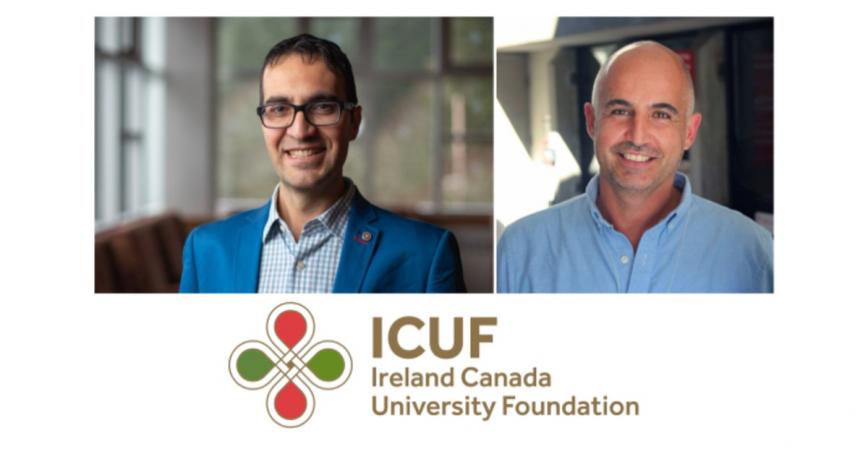Irish ties

Bridged by online public lectures, two School of Education and Technology faculty members have shared their ideas on the future of education with colleagues in Dublin through fellowships from the Ireland Canada University Foundation (ICUF).
Assoc. Prof. Frédéric Fovet (hosted by Trinity College Dublin) and Prof. George Veletsianos (hosted by Dublin City University) each received the ICUF’s D’Arcy McGee Beacon Fellowship, which encourages virtual collaborations among Irish and Canadian academics, researchers and thinkers.
Fovet was invited to discuss his research into universal design for learning (UDL) and its potential to remove barriers and broaden inclusion in teaching and learning in K-12 and post-secondary settings.
Veletsianos, holder of the Canada Research Chair in Innovative Learning and Technology and the Commonwealth Learning Chair in Flexible Learning, addressed how education is influenced by current trends in society and technology.
In each case, there is a natural link between the work done by the two Royal Roads professors and their respective host institutions in Ireland.
Natural links
“I’m really, really pleased with the fellowship because I do a lot of work with Ireland and that’s what drew me to the application in the first place,” says Fovet. “For me, it’s the culmination of five years of quite intensive work with Ireland. Obviously I’d still like to increase that volume of contact and collaboration.”
Fovet notes that a number of Irish scholars participated in a 2019 conference he hosted at Royal Roads on UDL. In addition, several of them have contributed to a book of UDL case studies he is editing and is due to be published in the coming weeks.
Trinity College Dublin is about to launch an ambitious project to improve inclusion in post-secondary education. Fovet says his lecture served as a “trigger point for reflection for the entire campus but also for the higher education landscape in Ireland generally.”
UDL is often used as a tool for the inclusion of learners with disabilities but Fovet sees a much wider potential. “They are really keen to move the dialogue further (in Ireland). UDL is really a relevant framework for the inclusion of all ‘non-traditional’ students.”
Veletsianos, whose interest lies in how people experience new learning environments and the application of flexible learning, says his work overlaps that of his colleagues at Dublin City University and so the fellowship was a good fit.
“Dublin City University does excellent work in this area,” he says. “I would say they are leading in efforts to use technology in unique and noteworthy ways to expand and improve upon educational provision. They have some exciting programs happening.”
Veletsianos’ talk encouraged participants to think about the extent that technology, on its own, can improve equitable access to education.
“Technology will not, necessarily, level the playing field. We need to pay greater attention to processes at our institutions to be able to expand access by making courses more flexible,” he says. “How can we support different people in ways that accommodate their lives? That’s basically what the flexible admission process at Royal Roads University accomplishes. It allows entry into programs and recognizes that people gain skills and competencies in different ways.”
Veletsianos says the pandemic has accelerated trends that were already underway, such as digitization, flexibility, and financial concerns.
“The pandemic has brought those things into a starker outlook,” he says. “More people recognize that higher education is facing very many challenges. I think a lot of people have come to see the value of new approaches to teaching and learning. What we’re suggesting is to pay greater attention to the needs of students and approach education through a lens that includes greater trust, greater relationship building, greater concern for the day-to-day realities of students.”